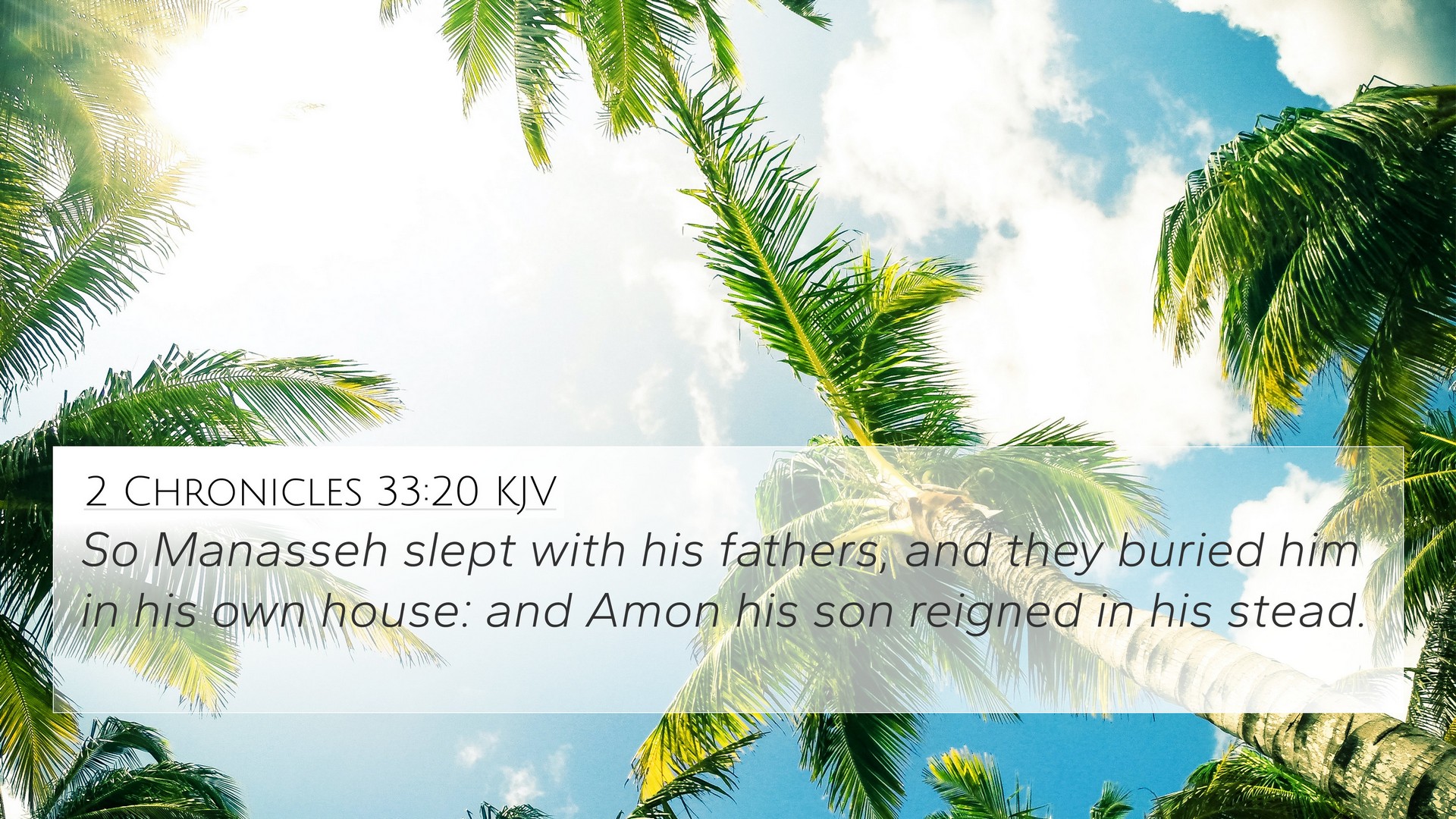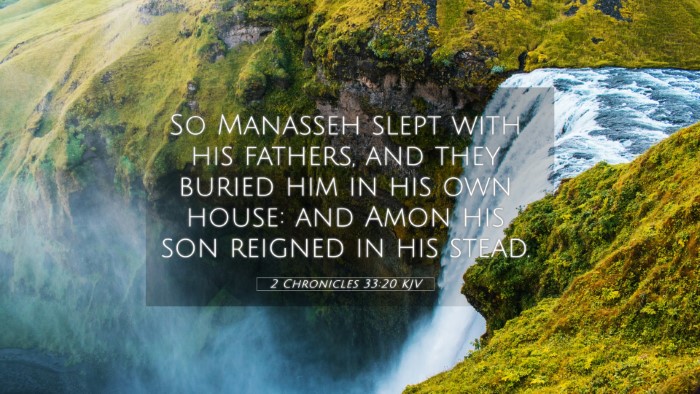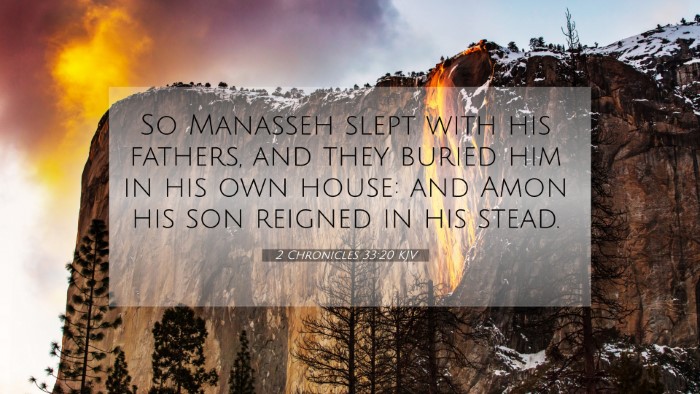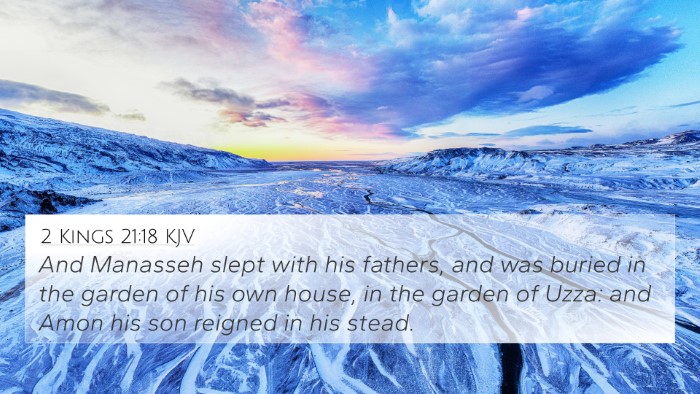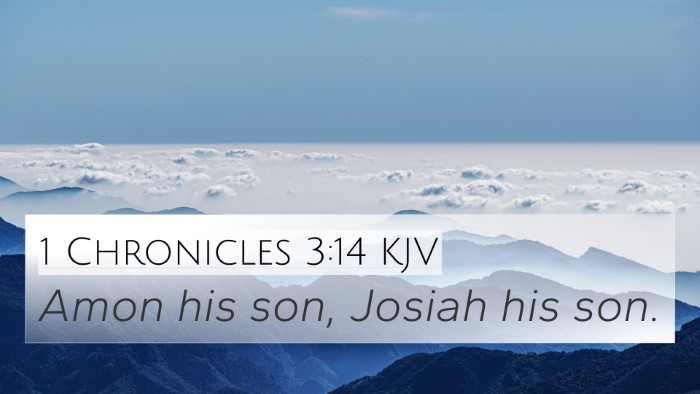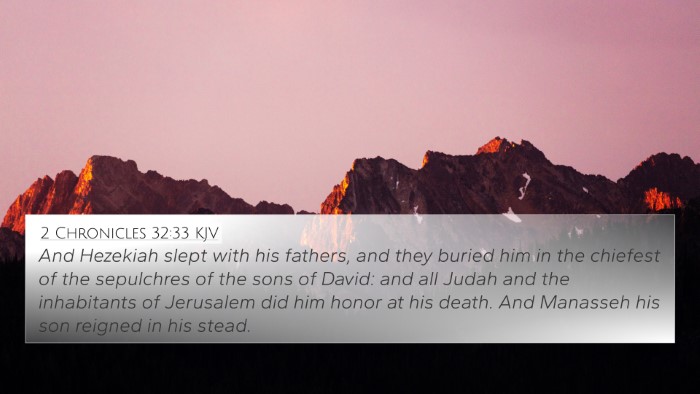Understanding 2 Chronicles 33:20
The Bible verse 2 Chronicles 33:20 states:
"And so Manasseh slept with his fathers, and they buried him in his own house: and Amon his son reigned in his stead."
Summary of the Verse
This verse marks the conclusion of King Manasseh's reign, highlighting his death and the subsequent succession of his son Amon. It serves as a pivotal narrative transition that reflects on Manasseh’s complex legacy as a ruler of Judah.
Commentary Insights
Matthew Henry's Commentary
Matthew Henry emphasizes the character of Manasseh, noting that despite his significant backsliding and idolatry, he was granted a period of humility and repentance. Henry remarks on the mercy of God, stating that this reflects God's willingness to forgive when one genuinely turns from sin. He also highlights the familial connection, stating that the final part of Manasseh's life was overshadowed by a return to righteousness, despite his earlier apostasy.
Albert Barnes' Notes
Albert Barnes mentions that Amon, Manasseh's son, ascended the throne after Manasseh's death, which is pertinent in tracking the lineage and the spiritual decline that occurred in Judah during this period. Barnes outlines Amon's reign as notably different, describing him as following in the footsteps of his father before his repentance, setting the stage for a continued struggle between good and evil in the kingdom.
Adam Clarke's Commentary
Adam Clarke notes the implications of burial practices and the honoring of kings. Acknowledging the significance of the burial site, Clarke indicates that Manasseh's resting place denotes some respect for his final years which included reform and a turn back to God. Clarke points out, however, that Amon's immediate succession without repentance reflects the ongoing issues that plagued the nation of Judah.
Connections Between Bible Verses
This verse stands out as a part of the larger narrative concerning the kings of Judah and their spiritual journeys. Here, we explore several relevant cross-references that enhance the understanding of this verse:
- 2 Kings 21:18-20: These verses recount Manasseh's life and his actions, providing details on his reign prior to his repentance.
- 2 Chronicles 33:12-13: Illustrates the moment of Manasseh's repentance, relevant in contrasting his earlier reign with his final years.
- 2 Kings 21:16: Highlights the bloodshed and idolatrous practices of Manasseh, showcasing the severity of his reign.
- 2 Chronicles 32:33: Provides information on the overall legacy of Manasseh nonetheless, despite his sins, he is buried as a king.
- Jeremiah 15:4: Refers to the calamities that followed Manasseh’s actions, illustrating the consequences his reign had on Judah.
- 1 Kings 15:11-15: Gives context for comparing the reigns of good and evil kings, showcasing the themes of repentance and divine mercy.
- Isaiah 65:11: Alludes to the idolatrous practices that characterized Manasseh’s reign, providing a prophetic warning to future generations.
- Romans 2:4: Offers insights on God’s kindness which leads one to repentance, relevant to understanding Manasseh’s late transformation.
- Matthew 12:41: Reiterates the theme of repentance, which may stir comfort for those who have strayed from God.
- Revelation 3:19: Reflects on the calling to repentance and its importance, resonating with Manasseh’s story of return.
Conclusion
In understanding 2 Chronicles 33:20, we see a blend of consequences, mercy, leadership transitions, and familial legacies in biblical history. By examining the commentaries of esteemed theologians alongside relevant cross-references, readers can deepen their understanding of not merely where this verse stands but how it connects to broader themes present throughout the scriptures. This also emphasizes the importance of examining the relationships between various Bible verses to gain full context and comprehension of biblical narratives.
Resources for Further Study
For those looking to dive deeper into the scriptures and their connections, consider utilizing:
- Comprehensive Bible concordance.
- Tools for Bible cross-referencing.
- Bible cross-reference guides.
- Cross-referencing Bible study methods.
- Bible reference resources for thematic connections.
- Inter-Biblical dialogue for a broader understanding of scripture.
